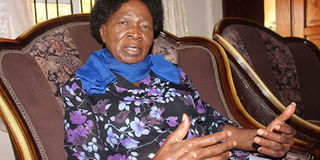Moi: Father figure who was keen on women's agenda

Former MP Phoebe Asiyo. She recalls that former president Daniel Moi was a gender activist. PHOTO | FILE | NATION MEDIA GROUP
What you need to know:
- Ms Asiyo said that by appointing Nyiva Mwendwa, Prof Margaret Kamar and Sally Kosgei, Mzee Moi affirmed his belief in women leadership.
- Ms Muiu says the fact that Moi toured the country to ‘confirm various reports’ and make quick decisions on the next step of action aided development.
Sometime in the 1970s, a widow in Central Kenya was about to be disinherited by her late husband’s relatives.
Then-President Daniel Moi got wind of her troubles and ordered the then Provincial Commissioner to immediately deal with the situation.
In no time, the dispute was resolved, with the relatives of the widow backtracking on the idea of dispossessing her of property.
It is an act of the rule of law that Phoebe Asiyo, a politician during Moi’s era can never forget. But this is not all!
Ms Asiyo, a women’s rights and gender equality activist, says Moi invested in crucial programmes that had a great “impact on the welfare of women but were rarely recognised”.
These were the school milk programme, constructing laboratories in girls schools, building agricultural centres in the provinces (now counties), ensuring there were enough agricultural extension officers and including women in public service.
“Both boys and girls did benefit from the milk programme, but I can say that in those days, boys could easily be fed at home than girls because of cultural issues that put boys first, and so the milk saved the girl-child from hunger when she had nothing to eat at home. The availability of milk really encouraged the girls to stay in school,” she said.
WOMEN LEADERSHIP
She said Mzee Moi realised that girls were disadvantaged in sciences, technology, manufacturing and mathematics studies that he endeavoured to built laboratories to encourage them to take up related subjects.
“To him it was an issue of affirmative action because he was being deliberate in creating supportive learning environment for the girls,” she observed.
“In the provinces, were functioning agricultural centres where the rural women farmers would be trained on better farming practices,” she said.
Although she agrees that Moi would have done better in women inclusion in government, Ms Asiyo said that by appointing Nyiva Mwendwa, Prof Margaret Kamar and Sally Kosgei, Mzee Moi affirmed his belief in women leadership.
Ms Mwendwa served as Minister for Culture and Social Services and she led the delegation of at least 450 women to the popular Beijing Conference in 1995.
ACCESSIBLE
In an interview with one of the local dailies, she pointed out that “her appointment may have been for the sole reason of leading the women to Beijing”.
The Beijing Conference, in its 25th anniversary, gave birth to Beijing Platform for Action, which outlines 12 key areas of focus, including promoting women rights to education, ending violence against women and involving them in peace building.
He appointed Prof Kamar to the East African Legislative Assembly, where she served between 1999 to 2006, and he made Dr Kosgei the Head of Public Service in 2001.
Ms Rahab Muiu, the current Maendeleo ya Wanawake chairperson, also served under the Moi regime. She describes him as a ‘100 per cent accessible father’ who listened to women’s voices.
“He was a father figure and reachable, which made it possible for us to share women’s concerns, with him,” she said.
Ms Muiu was the provincial chairperson for Eastern Province between 1996 and 2002. She had 13 districts under her watch and every quarter she processed reports and presented them to the Head of State.
FAIRNESS, EQUITY
This inflow of information from the grassroots to the president was uniform across all the eight provinces
“These reports contained the real issues about every district in the country. That flow of information helped us to know where there were no schools for girls and where help would be needed,” she said.
The fact that Moi toured the country to ‘confirm the reports’ and make quick decisions on the next step of action aided development, she said.
However, Mr Cyprian Nyamwamu, executive director of Future of Kenya Foundation, a policy and governance organisation, Moi can only be credited with “promoting girls’ access to education through building many schools that bear his name from Kuria to Kwale.... he was gender blind in almost all other areas,” he said.





